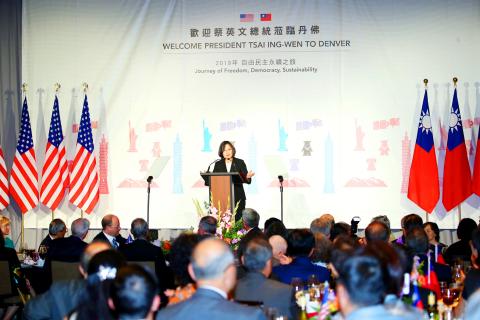President Tsai Ing-wen (蔡英文) on Friday told a large gathering of Taiwanese expats in Denver, Colorado, that Taiwan would not succumb to pressure, but would continue to safeguard its freedoms, democracy and sovereignty.
“Many of you here today are concerned about Taiwan’s future,” Tsai said, addressing the 700-plus Taiwanese guests at a banquet held in her honor during her stopover in Denver on the return leg of her visit to Taiwan’s four diplomatic allies in the Caribbean.
Many people are anxious because China is perceived as closing in on Taiwan and has resorted to a carrot-and-stick approach to pressure Taiwan’s 23 million people into accepting its “one country, two systems” model, Tsai said, mostly in English, but with some Mandarin and Hoklo (commonly known as Taiwanese) thrown in.

Photo: CNA
Feelings of anxiety have been heightened by the sight of Hong Kong gradually losing its freedoms and democracy, she said, referring to massive protest triggered by an extradition bill that would allow the Hong Kong government to extradite criminal suspects to China.
“That has us worried about whether Taiwan’s sovereignty and democracy will also disappear,” Tsai said at the banquet, which was also attended by American Institute in Taiwan Chairman James Moriarty, Colorado Governor Jared Polis, US Senator Cory Gardner and US Representative Doug Lamborn.
Tsai said that China’s suppression of Taiwan has been evident throughout her trip, including several complaints that Beijing lodged with the US government.
It has also shown up as information warfare, or disinformation, used to infiltrate Taiwanese society, she said.
“Next year will be a critical time for us to safeguard Taiwan’s democracy,” Tsai said, urging Taiwanese expats to return home next year to vote.
Solidarity is needed in the fight to protect Taiwan’s democracy and way of life for future generations, said Tsai, who is seeking re-election.
Arriving at about 3pm on Friday in Denver — the last leg of her 12-day overseas visit, including a stopover in New York City — Tsai and her delegation were received by Moriarty and Representative to the US Stanley Kao (高碩泰).
Prior to Tsai’s arrival, hundreds of Taiwanese expats had gathered outside the Hilton Denver City Center, where she was to stay.
Many waved the national flags of the Republic of China and the US, while others held banners that read: “Taiwan,” or bore slogans such as “Freedom and democracy, safeguard Taiwan.”
About a dozen Chinese protesters demonstrated near the hotel, waiving the People’s Republic of China national flag and chanting: “One China.”
No clashes occurred.
Tsai’s itinerary yesterday included visits to the National Renewable Energy Laboratory, a US federal laboratory dedicated to renewable energy development, and the National Center for Atmospheric Research, which developed Formosat-7, the second satellite cluster jointly built by Taiwan and the US.
She is scheduled to arrive in Taiwan tomorrow.

An essay competition jointly organized by a local writing society and a publisher affiliated with the Chinese Communist Party (CCP) might have contravened the Act Governing Relations Between the People of the Taiwan Area and the Mainland Area (臺灣地區與大陸地區人民關係條例), the Mainland Affairs Council (MAC) said on Thursday. “In this case, the partner organization is clearly an agency under the CCP’s Fujian Provincial Committee,” MAC Deputy Minister and spokesperson Liang Wen-chieh (梁文傑) said at a news briefing in Taipei. “It also involves bringing Taiwanese students to China with all-expenses-paid arrangements to attend award ceremonies and camps,” Liang said. Those two “characteristics” are typically sufficient

A magnitude 5.9 earthquake that struck about 33km off the coast of Hualien City was the "main shock" in a series of quakes in the area, with aftershocks expected over the next three days, the Central Weather Administration (CWA) said yesterday. Prior to the magnitude 5.9 quake shaking most of Taiwan at 6:53pm yesterday, six other earthquakes stronger than a magnitude of 4, starting with a magnitude 5.5 quake at 6:09pm, occurred in the area. CWA Seismological Center Director Wu Chien-fu (吳健富) confirmed that the quakes were all part of the same series and that the magnitude 5.5 temblor was

The brilliant blue waters, thick foliage and bucolic atmosphere on this seemingly idyllic archipelago deep in the Pacific Ocean belie the key role it now plays in a titanic geopolitical struggle. Palau is again on the front line as China, and the US and its allies prepare their forces in an intensifying contest for control over the Asia-Pacific region. The democratic nation of just 17,000 people hosts US-controlled airstrips and soon-to-be-completed radar installations that the US military describes as “critical” to monitoring vast swathes of water and airspace. It is also a key piece of the second island chain, a string of

The Central Weather Administration has issued a heat alert for southeastern Taiwan, warning of temperatures as high as 36°C today, while alerting some coastal areas of strong winds later in the day. Kaohsiung’s Neimen District (內門) and Pingtung County’s Neipu Township (內埔) are under an orange heat alert, which warns of temperatures as high as 36°C for three consecutive days, the CWA said, citing southwest winds. The heat would also extend to Tainan’s Nansi (楠西) and Yujing (玉井) districts, as well as Pingtung’s Gaoshu (高樹), Yanpu (鹽埔) and Majia (瑪家) townships, it said, forecasting highs of up to 36°C in those areas